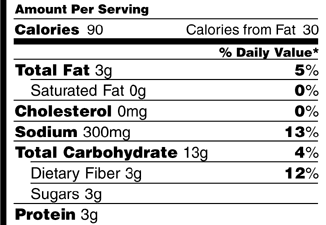Nutrition Basics: Part I
Deciphering the information in a food label can be tricky, especially for someone who hasn’t spent significant time studying nutrition. For an athlete, understanding nutrition is critical to developing a proper eating plan. Also, the advice you hear every day about nutrition may not always be appropriate for athletes focused on performance. This post breaks down the major components of nutrition to get you started on selecting the best foods to maximize your game-time potential.
The daily requirements listed below are recommended for athletes.
Calories: A calorie is a measure of energy stored in food. Your body needs calories to function. Low level activity and bodily functions require about 1,750 calories a day, depending on the person. For active athletes, energy requirements are much higher, so more food must be eaten to fill the energy gap.
Daily requirement: 2,800 – 5,000 calories
Protein: Protein provides the building blocks for your muscles, so it’s critical to consume sufficient amounts if you want to perform at your best or make strength gains. In addition, protein can be used as an energy source, and it’s vital for other bodily function, such as hormone creation.
Daily requirement: .8 – 1.5 grams per kilogram of bodyweight*
Carbohydrates: Carbs are your primary energy source, providing instant and long-lasting fuel. It’s important to eat enough carbs to ensure that your body does not use protein as an energy source,which can sabotage your performance or reduce potential strength gains.
Daily requirement: 5 – 6 grams per kilogram of bodyweight*
Fat: Fat functions to store energy and provide protection for your organs. Although eating fat is often associated with an unhealthy diet, this isn’t necessarily true for athletes. Totally avoiding fats, which are often present in nutrient-rich foods, can lead to a lack of energy and malnutrition. Avoid trans fat and saturated fat, particularly the kind found in some processed food and animal fat, and opt for foods with monounsaturated and polyunsaturated fats, such as extra virgin olive oil and most types of nuts.
Daily requirement: 30% of caloric intake
Check back next week for “Nutrition Basics: Part II,” a breakdown of common vitamins and minerals.
*To find weight in kilograms, divide bodyweight in pounds by 2.2. For example, 198 lbs. / 2.2 = 90 kg.
RECOMMENDED FOR YOU
MOST POPULAR
Nutrition Basics: Part I
Deciphering the information in a food label can be tricky, especially for someone who hasn’t spent significant time studying nutrition. For an athlete, understanding nutrition is critical to developing a proper eating plan. Also, the advice you hear every day about nutrition may not always be appropriate for athletes focused on performance. This post breaks down the major components of nutrition to get you started on selecting the best foods to maximize your game-time potential.
The daily requirements listed below are recommended for athletes.
Calories: A calorie is a measure of energy stored in food. Your body needs calories to function. Low level activity and bodily functions require about 1,750 calories a day, depending on the person. For active athletes, energy requirements are much higher, so more food must be eaten to fill the energy gap.
Daily requirement: 2,800 – 5,000 calories
Protein: Protein provides the building blocks for your muscles, so it’s critical to consume sufficient amounts if you want to perform at your best or make strength gains. In addition, protein can be used as an energy source, and it’s vital for other bodily function, such as hormone creation.
Daily requirement: .8 – 1.5 grams per kilogram of bodyweight*
Carbohydrates: Carbs are your primary energy source, providing instant and long-lasting fuel. It’s important to eat enough carbs to ensure that your body does not use protein as an energy source,which can sabotage your performance or reduce potential strength gains.
Daily requirement: 5 – 6 grams per kilogram of bodyweight*
Fat: Fat functions to store energy and provide protection for your organs. Although eating fat is often associated with an unhealthy diet, this isn’t necessarily true for athletes. Totally avoiding fats, which are often present in nutrient-rich foods, can lead to a lack of energy and malnutrition. Avoid trans fat and saturated fat, particularly the kind found in some processed food and animal fat, and opt for foods with monounsaturated and polyunsaturated fats, such as extra virgin olive oil and most types of nuts.
Daily requirement: 30% of caloric intake
Check back next week for “Nutrition Basics: Part II,” a breakdown of common vitamins and minerals.
*To find weight in kilograms, divide bodyweight in pounds by 2.2. For example, 198 lbs. / 2.2 = 90 kg.













